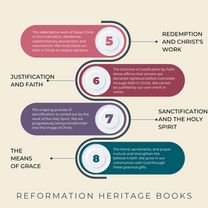Justification and Faith: Theme #6 of the Westminster Shorter Catechism
Posted by Jonathan Landry Cruse on 6th Dec 2023
Are you on good terms with God? That is the basic question of religion. And to that fundamental question, Professor John Murray has given a terrifying answer: “How can we be right with [God?] The answer, of course, is that we cannot be right with him; we are all wrong with him.” This is the Bible’s answer as well: “for all have sinned and fall short of the glory of God” (Rom. 3:23). When we reckon with this fact, the shadow of God’s wrath and curse grips our hearts with terror. But just as we might give into despair, in comes the freeing doctrine of justification to announce that all hope is not lost. That’s exactly how Paul follows up his evaluation of humanity in Romans 3, with a statement about the glories of justification: we can be “justified freely by [God’s] grace through the redemption that is in Christ Jesus” (v. 24).
What does it mean to be “justified” exactly? I think there is no better definition than that given by the Westminster Shorter Catechism. It’s succinct, easy to memorize, and most importantly it shows beyond a shadow of a doubt that the only way for sinners and rebels like us to be on good terms with God is by His own grace to us in the gospel.
Q. 33. What is justification?
A. Justification is an act of God’s free grace, wherein he pardoneth all our sins, and accepteth us as righteous in his sight, only for the righteousness of Christ imputed to us, and received by faith alone.
Notice that justification is an act of God, not of man. We contribute nothing to our salvation. God acts—in this case, through the person and work of Christ—and the results come to us as “free grace.” In one sense, this phrase is redundant. Grace wouldn’t be grace if it wasn’t free. But it’s a blessed redundancy, as the Catechism revels in God’s benevolence to fallen man. Here we affirm that no one forces God’s hand to save us. He is moved only by the compulsion of His own love and pity.
God’s grace of justification is twofold. It includes both pardon and acceptance. In other words, God’s work of salvation not only forgives the debt of sin, but also credits us the righteousness necessary so that gates of glory will swing open for us (Psalm 118:19). To be accepted us righteous means we can be in God’s presence. He welcomes us as though we were not sinners in the first place! The Christian can use the language of the Catechism and declare, in the face of sin and doubt, “I am accepted as righteous in God’s sight!” Talk about being on good terms with God!
The reason God sees us as righteous is “only for the righteousness of Christ imputed to us and received by faith alone.” God graciously deigns to look on His elect and see them, not in their sin, but in His Son. Everything that is ours—like our sin and shame—is give to Christ, and everything that is His—like His righteousness and reward—becomes ours. “For He made Him who knew no sin to be sin for us, that we might become the righteousness of God in Him” (2 Cor. 5:21). This reality was once expressed in a hymn:
I bless the Christ Who took my sin,
My pardon fully paid,
Then gave to me His righteousness—
An undeservéd trade!
This glorious exchange comes to us by faith alone. While that might seem simple, it is far from easy. That’s because faith, which is looking to Jesus and away from ourselves, is terribly difficult at times for self-obsessed and works-wired sinners. But there is no good I can lay ahold of to change God’s perspective of me—except Jesus. He is the Good that I must take hold of by faith. What turns the heart of God in grace towards sinners is seeing them in Christ. So we should turn our hearts to that Savior in faith today and, in the words of another catechism, “accept this gift with a believing heart.”
Doing so will mean you can answer this question without dread: are you on good terms with God? Remember the words of Romans 5:1, “Therefore, having been justified by faith, we have peace with God through our Lord Jesus Christ.”
By Jonathan Landry Cruse

Devotions in the WSC? Sign me up!
Glorifying and Enjoying God: 52 Devotions through the Westminster Shorter Catechism is now available from Reformation Heritage Books. Get your copy today and begin your devotions through the WSC in just a few days from now.

